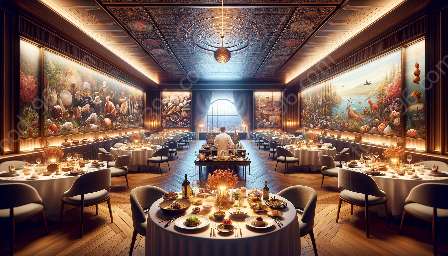Haute cuisine, a term derived from the French language meaning 'high cuisine,' represents the pinnacle of culinary artistry and gastronomic excellence. It has significantly influenced modern cuisine history, shaping the way we perceive and experience food. In this topic cluster, we will delve into the origins, evolution, and enduring impact of haute cuisine, highlighting its contributions to the culinary world and its relevance in contemporary gastronomy.
The Origins of Haute Cuisine
The roots of haute cuisine can be traced back to the 17th century in France, during the reign of King Louis XIV. It was in this era that the concept of refined, elaborate cooking and dining experiences began to emerge, primarily within the royal courts and aristocratic circles. French chefs, known as 'cuisiniers,' perfected the practice of haute cuisine, emphasizing precision, elegance, and artistic presentation in their culinary creations. This marked the beginning of a culinary revolution that would shape the future of gastronomy.
The Evolution of Haute Cuisine
As haute cuisine continued to evolve, it expanded beyond the confines of the aristocracy and gained prominence in upscale restaurants and lavish banquets. The 19th century witnessed the rise of legendary chefs such as Auguste Escoffier, whose innovations and codifications laid the foundation for modern haute cuisine. Escoffier's emphasis on meticulous organization, classic techniques, and the use of rich stocks and sauces became defining characteristics of haute cuisine, influencing culinary practices worldwide.
The Influence of Haute Cuisine
Haute cuisine's influence transcended national borders, inspiring culinary revolutions in various regions across the globe. Its impact on modern cuisine history is evident in the proliferation of fine dining establishments, the emergence of nouvelle cuisine, and the integration of haute cuisine principles into contemporary cooking styles. The pursuit of culinary excellence and the relentless quest for perfection, core tenets of haute cuisine, continue to shape the ethos of professional chefs and culinary enthusiasts today.
Haute Cuisine in Contemporary Gastronomy
Despite the evolution of culinary trends and shifts in consumer preferences, haute cuisine remains a symbol of sophistication, innovation, and culinary mastery. In the 21st century, haute cuisine has adapted to incorporate diverse cultural influences, sustainable practices, and avant-garde culinary techniques. Renowned chefs and establishments are redefining haute cuisine by embracing modernity while upholding its traditional essence, creating a dynamic landscape that celebrates the fusion of heritage and innovation.
The Future of Haute Cuisine
Looking ahead, the future of haute cuisine promises continued evolution and reinvention as chefs explore new frontiers in gastronomy. The integration of technology, environmental consciousness, and global culinary dialogues will shape the trajectory of haute cuisine, ensuring its enduring relevance in the ever-changing culinary world.
Conclusion
The rise of haute cuisine has left an indelible imprint on modern cuisine history, elevating the art of cooking to unprecedented heights and inspiring generations of culinary luminaries. The legacy of haute cuisine continues to resonate in the ethos of fine dining, culinary education, and the relentless pursuit of culinary excellence. As we navigate the culinary landscape of today and tomorrow, the influence of haute cuisine will endure as a testament to the timeless pursuit of gastronomic perfection.

